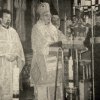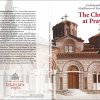Bishop Christopher came at the helm of the Eastern American and Canadian Diocese when the Diocese was well organized by his two predecessors. He focused on the Church schools and religious education of adults. There was already an Education Department with developed plans and programs. In addition to the Church Educational work during the period of Bishop Christopher’s administration, new Church School Congregations and parishes were organized; new Churches and other facilities were built.
In 1910, Petar Kovacevich left his town of Grahovo and after a lengthy and arduous journey he arrived in the southern part of America, on the shore of the Gulf Coast in the city of Galveston where the oldest organized Serbian parish in America originated in 1862–1864. After four years, in 1914 on St. Vitus Day (Vidovdan), his bride Rista nee Vujačić, a native of Grahovo, arrived and together through hard physical labor they gave birth and raised twelve children, eight sons and four daughters. The ninth born child, Velimir, was born on 25 December 1928, according to the new calendar, which he, despite his baptized name Velimir, was nicknamed Chris by his American friends, by which he was known to his circle of friends and acquaintances.
He was baptized at the Holy and Equal to the Apostles, Emperor Constantine and Helena in Galveston. From his marriage to Milka (Raicevich) she gave birth to four children. Petar, Paul Valerie and Velimir.
He grew up in the church of Saints Constantine and Helen in Galveston. Galveston has one of the oldest Serbian churches in America. The temple was consecrated by Bishop Nicholai of the Russian Orthodox Diocese of Alaska on June 3, 1896. From an early age Velimir helped serve in the altar. During school holidays and summers he worked in a bakery with his brother George and delivered newspapers. Having completed his primary education in 1945 he set off for Libertyville where the only seminary was opened in the monastery of St. Sava.
He graduated from St. Sava Seminary in Libertyville. He furthered his education at the University of Pittsburgh and the University of Chicago. When he completed seminary in Libertyville in 1949 he moved to the city of Akron, Ohio. With the blessing of the local bishop Dionisije, on the Day of the Lord’s Ascension in 1949, Velimir was tonsured a reader by Bishop Nicholai Velimirović. During his studies he met Milka Raicevich where they enter into the holy sacrament of marriage on September 20, 1951. The same year on November 25 he was ordained into the diaconate and on December 2 into the rank of priesthood. Both ordinations were officiated by Bishop Dionisije of the American-Canadian Diocese.
In November 1951, Velimir Kovačević was ordained Deacon in St. Mary’s Church in Clairton. On December 2, 1951, he was ordained priest in St. Nicholas Church in Johnstown where he served as parish priest until 1954. In 1954, he was transferred to St. Sava Church in Pittsburgh. During his priestly ministry in Pittsburgh, he served as a spiritual chaplain at the four local universities. In 1962, he was elected permanent priest of Holy Archangel Michael Church in South Chicago where he remained until he was elected Bishop in May 1978. South Chicago is where the world’s largest steel companies were found and it’s around them that a few of the Serbian colonies are formed. It is the main Serbian colony which was formed on the periphery of the city itself where a few Serbs under the spiritual direction of Archimandrite Firmilian, later Bishop of Skopje, in 1892, dedicated a Serbian chapel which brought together more than 200 Serbs.
As the parish priest of South Chicago he completed his master’s degree at the University of the Holy Cross in Boston. Having completed all his final exams he received his Doctoral degree with studies at the Theological Faculty of the University of Chicago but was prevented from defending his thesis due to his numerous obligations. He received an honorary doctorate degree during a ceremony from the Anglican Seminary Nashotah House in 1997. Despite his parish commitments Father Velimir completed his studies in Philosophy and a Master’s degree in the field of History at the University of Pittsburgh.
Before election as bishop, he occupied various positions on the Diocesan and Central Church level: Director of Education Department of the Midwest Diocese, Member of the Central Church Council-Education Department, Secretary of the Church Central Council, Camp Director in Libertyville, Shadeland (Pennsylvania) and Coloma (Wisconsin).
Velimir Kovačević was tonsured as a monastic in the Patriarchal Chapel by Patriarch German and received the name of Christopher. He was consecrated bishop on June 18, 1978 in the Cathedral in Belgrade. In July 1978, he was installed as Bishop of the Eastern American and Canadian Diocese. He remained at that position until 1991 when the Holy Bishops’ Assembly elected him Metropolitan of the Midwest Metropolitanate.
He also served as secretary of the Central Council; the Director of the Commission for Religious Education and of the Children’s Summer Camp Program. He was also the editor of two church magazines. As pastor of South Chicago he founded the Serbian Orthodox Association for Religious Educators and the Youth. The main focus of this organization was to promote quality education for the religious instructors. This organization is still in existence.
When schism broke out in the Serbian Orthodox Church in America and Canada in 1963, archpriest Velimir Kovacevich remained with his parish, with the Mother Church and the Serbian Patriarch. He was rewarded through his great efforts and merits able to witness and attain his long held desire of church unity on the North American continent which was finally realized. During the schism he was appointed by the Holy Synod and Assembly as the lead interpreter before the state and federal courts. He had translated a large volume of documents during that time into Serbian.
At its regular May session, and on the proposal of Bishop Firmilian Ocokoljić, the Holy Assembly of Bishops of the Serbian Orthodox Church in 1978 chose to elect the archpriest Velimir Kovacevich as Bishop of Eastern American and Canadian Diocese. In his recommendation, Bishop Firmilian wrote:
On Pentecost, June 18, of the same year he was consecrated by Patriarch German, acquiring the name Christopher after St. Christopher. It was also a fitting name because as he was born on Western Christmas his nickname growing up was Chris, by which he was continued to be called by his siblings and referred to as “Uncle Chris” by his many nieces and nephews. Kovacevich was the second Serbian bishop born in America. The first was Bishop Varnava Nastich. The first official address of the newly elected Bishop of Eastern America and Canada by Bishop Christopher upon returning to his God-protected diocese was presented on August 13, 1978.
Although Bishop Christopher came to an established diocese he still had much to do. His first concern was for the church schools and for adult religious education. For this reason, soon after taking over the diocese, he organized courses of several months duration for the training of church school teachers. That program successfully concluded after two years. He also took steps through the diocesan education department to ensure that as much as possible would be done for the religious education of adults.
Bishop Christopher also very diligently visited throughout the diocese, both in the American part as well as in huge Canada, until upon his proposal, it was established into an independent diocese. During his time, there has been considerable building activity in the diocese. He has consecrated seven churches, and blessed one chapel, one church school, one church hall and two parish homes. He has also been successful in filling vacant parishes. He has ordained fourteen men to the holy deaconate or holy priesthood, or both orders, for a total of 24 ordinations.
As Bishop of the Eastern America and Canadian Diocese he developed a religious educational program. He completely computerized the diocesan administration which is still in use today. He represented the Serbian Orthodox Church in the Conference of Orthodox Bishops and participated in the work of the joint commission of Orthodox and Roman Catholic bishops as well as the Orthodox-Lutheran dialogue. He also represented the Serbian Orthodox Church in the World Council of Churches.
Bishop Christopher is to be credited for the forming of the Canadian Diocese in 1983. Before that Canada was part of the Eastern American Diocese. He proposed to the Holy Assembly of Bishops in 1983 to consolidate the Diocese entrusted to him and to establish two: the Eastern American Diocese to be headquartered in Edgeworth, and the Diocese of Canada to be headquartered in Toronto. He went on to administer the Eastern American Diocese until 1991.
At its regular May session of the Holy Synod, in 1991, the first Metropolitan of the Mid-Western America headquartered in to the monastery of St. Sava in Libertyville was elected. Since his arrival as the Metropolitan he served as Dean of the Faculty of Theology in Libertyville. He brokered with the state authorities to have the school accredited with all institutions of higher learning in the United States and Canada as well as in Europe.
After the consolidation of the Serbian dioceses in the United States, and to the benefit of the Church, 2009, Metropolitan Christopher received a new title: he became Metropolitan of Libertyville-Chicago, and his entrusted Midwestern diocese he surrendered to Bishop Longin of New Gračanica.
The Holy Assembly in its session of 21 May 2009, made the decision, “that the canonical territory of the Serbian Orthodox Church in North and South America now comprises of: the Metropolitanate of Libertyville-Chicago, based in the monastery of St. Sava in Libertyville (including the Saint Sava monastery in Libertyville and the Cathedral of the Resurrection of Christ with her three accompanying parishes in Chicago), of which the Metropolitan will be the chairman of the Episcopal Council of the Serbian Orthodox Church in North and South America, as well as the National-Church Council and the Central Committee, as well as the ex officio representative of the Serbian Orthodox Church on the territory of North and South America.”
Therefore, it was not difficult for him to “gift” his entire Diocese to unite with the Diocese of New Gračanica, for the sake of God-pleasing unity, retaining for himself only one church in Chicago and the most significant monastery of St. Sava in Libertyville.
Metropolitan Christopher passed away on the eve of the feast of the Transfiguration of the Lord, 2010, at the monastery of St. Save in Libertyville.
If anyone today can be named an undisputed witness and activist in the grand history of the Serbian diaspora on the North-American continent it is undoubtedly Metropolitan Christopher.





